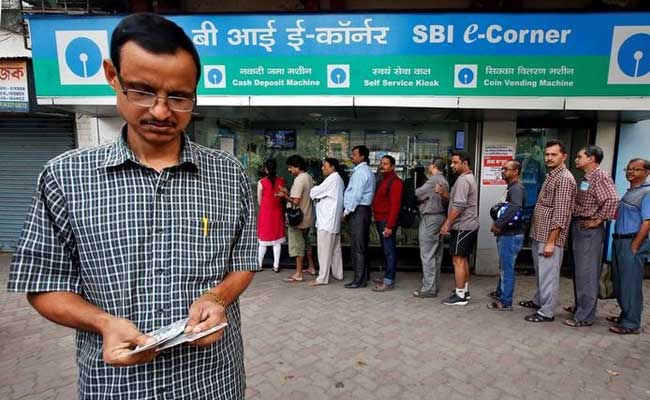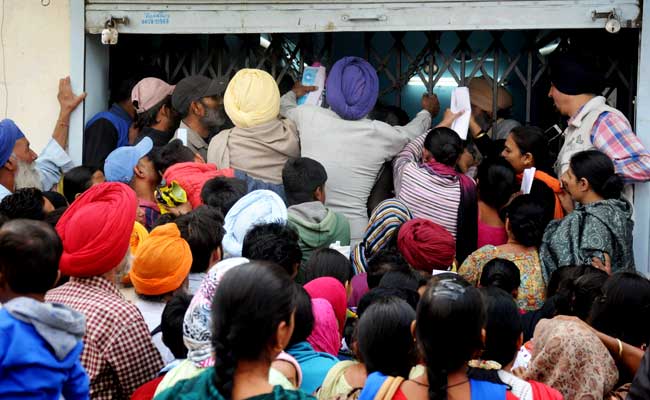Prime Minister Narendra Modi appeared to wield a magic wand on the night of November 8 when he announced demonetization of Rs 1,000 and Rs 500 currency notes from midnight. Initial reaction to this was uniformly positive as it seemed to be an effective surgical strike against black money stashed away by big traders and industrialists, apart from many politicians and some corrupt bureaucrats. The announcement was in keeping with Mr Modi's repeated assurance to crack down on undeclared incomes at home and abroad to force more resources to come into the mainstream of the national economy.
However, the government may have underestimated the inconvenience this would cause to daily wage earners and the salaried middle class. There are instances of big cash holders throwing bundles of currency notes into rivers and drains, with one businessman in Mumbai apparently setting fire to his stash of Rs 50 crore worth of Rs 500 and Rs 1,000. But judging by the queues outside banks and ATM outlets throughout the country since they reopened on November 10, it is apparent that those most immediately affected are not really the so-called Dhanna Seths (Money Bags). It is the proverbial common man who has been hit the hardest for now and that includes farmers and the rest of the rural population.

A man counts banknotes after withdrawing them from State Bank of India ATM in Kolkata.
Anti-Modi commentators are quibbling over how much black money will be unearthed from demonetization of bigger currency notes. It is said that much of the black money generated in India is invested in real estate, gold, the securities market and, finally, in tax havens abroad. This is a ridiculous argument because it refers only to past black money. If that has already been invested in various sectors such as real estate, the money is already in the mainstream. But when somebody tries to sell his property now, (assuming it has been acquired with black money), he will no longer be able to generate black currency afresh as most buyers would have no illicit resources with them after demonetization unless the cycle of accumulating cash starts all over again. Even if that were to happen, it would take a very long time to generate black money in sufficient quantities to make up for the lost amount. In other words, real estate sellers will be forced to accept payment by cheque and pay tax on it, severely curbing the generation of black money in the economy.
The government's larger aim, as reiterated by Finance Minister Arun Jaitley, is to move in the direction of a cashless economy which is the norm in most developed countries. For that, it is essential that every citizen - part of the existing workforce or retired - has a bank account. Clearly, the Prime Minister had this goal in his line of vision when he announced the Jan Dhan Yojana to expand the ambit of banking. With various subsidies, pension and even students' scholarships being progressively transferred directly to people's bank accounts (DBT), India has moved steadily towards the objective of a cashless economy. Demonetization of higher denomination currency notes will lend a big momentum to this process. This is a remarkable achievement in a short span of 32 months since the BJP government took office.

People waiting outside a bank to exchange and deposit cash.
The cliches - "no gain without pain" and 'pain today for gain tomorrow' - are being frequently bandied about with considerable merit. Indeed, the long-term benefits of demonetization far outweigh the current inconvenience. In one fell swoop, fake currency that was flooding the Indian economy from Pakistan and some other neighbours has been eliminated. Pakistan-sponsored terrorists in sleeper cells in India have been rendered penniless overnight as all such subversive activities were lubricated through large denomination currency notes. Arguably, the middle class is facing enormous temporary hardship. Over the years, we have forgotten what long queues were like in the days of the shortage economy during the Indira Gandhi years or earlier. Understandably, therefore, tempers are frayed, rumours of all kind are spreading furiously, and some shops are being looted too - scenes not witnessed for at least two decades.
Since the advent of economic liberalization in the early 1990s, the economy has evolved greatly and is more complex than ever before. But a country that has boldly embraced the computer age and is getting used to electronic or mobile banking cannot coexist with the pot-bellied money-lender shortchanging people. India has to become a modern, digitised, cashless economy even if it has to be dragged into that era kicking and screaming. Once the convulsion dies down in a week or so from now, the angry shouts of the middle class will easily cease. The only sounds to grip the nation then will be the plaintive cries of the Dhanna Seths and the corrupt. Deservedly, they will be wailing over their loss of power and pelf.
(Dr. Chandan Mitra is a journalist, currently Editor of The Pioneer Group of Publications. He is also former BJP MP, Rajya Sabha.)
Disclaimer: The opinions expressed within this article are the personal opinions of the author. The facts and opinions appearing in the article do not reflect the views of NDTV and NDTV does not assume any responsibility or liability for the same.


